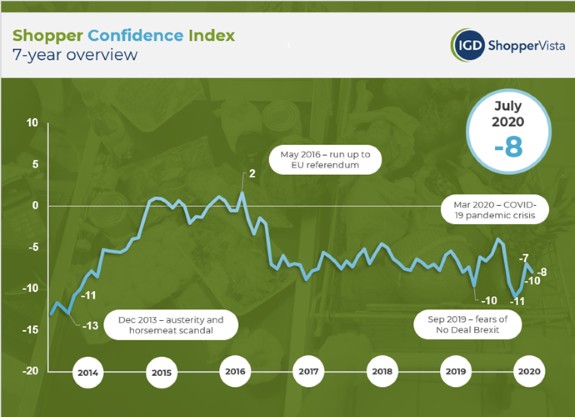Shopper confidence is starting to experience regional differences as local lockdowns become a reality across the country, according to the latest IGD Shopper Confidence Index. While overall confidence remains relatively low, the latest results also reveal distinct differences emerging between demographic groups.
The IGD Shopper Confidence Index comes in at -8 for July, which is slightly down on the previous month. Despite remaining low, the score is considered to be generally stable.

Insights from the latest index include shopper confidence decreased significantly in the North of England, dropping from -3 in June to -9 in July. This comes at a time when a spike in cases has resulted in local lockdowns affecting large parts of the region.
Wales also saw a large decline in confidence but it increased in Scotland.
Meanwhile, younger shoppers aged 18-24 were more confident in July with a score of +3. In contrast, those aged 65+ were less confident with these shoppers more fearful of food price inflation (+3% vs June’20) and more fearful they will be worse off financially in the year ahead (+7%).
83% of all shoppers expect food prices to get more expensive in the year ahead, the highest level since June’13.
Simon Wainwright, Director of Global Insight at IGD, commented: “As local lockdowns are enforced across the country we will likely see more of a split in confidence between regions as the impacts of COVID-19 become more localised. While July’s data shows an increase in confidence among Scottish shoppers, we anticipate a different picture for August following the news of Aberdeen’s lockdown.
“It is likely that younger shoppers have been particularly boosted by the generally warm weather and the relaxation of some lockdown measures including the reopening of non-essential retail and the hospitality sector. Job security was also boosted by the extension of the job retention scheme until October’20 and the support for the foodservice sector.
“We predict that shopper confidence is likely to remain fragile as shoppers contend with the impact of a deep economic downturn in 2020.”



